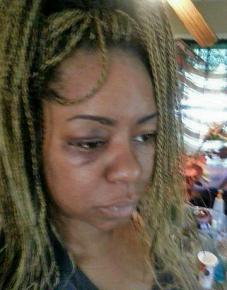Beaten by police for staying on the phone
is a national board member of the Campaign to End the Death Penalty and a victim of Chicago police commanded by Jon Burge who was tortured into making a false confession and spent 28 years in prison before he was released. Here, he reports on another case of police violence--this time against a 41-year-old African American woman.
CAN YOU imagine being abused by police? Many people are under the impression that someone has to commit a crime to draw attention of the police. But over the last few years, we have learned that it only requires being in the wrong place at the wrong time to experience police abuse, violence--and sometimes even death.
I experienced police torture at age 16 and was sent to a prison for a crime I didn't commit, sentenced to natural life. I spent 28 years inside the Illinois Department of Corrections before my sentence was overturned. It continues to amaze me just how much leeway police, prosecutors and judges get to continue their pattern of criminal behavior toward innocent people.
Now, Danielle Adams, a 41-year-old African American woman in Chicago, knows the abuses of the police firsthand. Before last month, she had never been arrested before--though she knew just how corrupt police can be because of her efforts to help two friends sent to prison in Illinois in connection with a drive-by which knew for two decades that they didn't commit.

Last month, a family member, involved in a heated argument with her adult son, called police--and that's when the nightmare started for Adams.
Adams says the family member reported to police that her son had a gun, but she says he didn't pull it out or show it in an intimidating manner toward her, the police or anyone else. Adams' son is licensed to have the gun because of his job as a security guard.
Adams said the police who responded to the call came into her home and abused her son until they learned the gun was legal. Embarrassed, they turned on Adams and ordered her off her telephone. When she refused, one of the officers called her a degrading name. She responded--and that's when she was thrown against the wall inside her residence, and then dragged outside and repeatedly struck until she became unconscious.
Adams was rushed to a hospital for treatment. She informed medical personnel what had occurred, but she found herself charged by police with assault. Adams described to me what happened next, as her eyes filled with tears:
I was taken into police custody. Why would they arrest me? They started it, one of the officers knocked me out! I was charged with assault because during the confrontation, I grabbed at the officers, I spit at one of them, and I called them the same degrading names they were calling me.
I was charged for defending myself. The officers have gotten away so far while I face criminal charges of assault and could be sentenced to prison. No one can tell me that they wouldn't have done what I did, if they were faced with the reality of getting hit in the face because they were talking on their cell phone.
Adams is poor and can't afford legal representation, so she has been forced to accept an assistant Cook County Public Defender. Adams says the public defender has reviewed none of the evidence in the case, never reviewing the pictures of her injuries, nor the hospital reports, nor interviewing witnesses--but he immediately reached the conclusion that the police case against her is airtight. As Adams said:
How can this be adequate legal representation. Just because I'm poor, I should not be provided a lesser degree of services. Based off the compelling evidence, I should be assigned a lawyer experienced in police brutality, not someone who walks into a courtroom for the initial court date and reaches a conclusion as to my fate without ever examining my side of the case.
Adams was released by a judge on an I-bond, but was placed on home monitoring pending the outcome of her case. She isn't allowed to leave her residence without permission of the Cook County Sheriff's office. For more than a month, she wasn't allowed to go to her job, so Adams was placed on administrative leave pending the outcome of the case. "I've lost everything I've worked for, and face the possibility of being homeless," Adams said.
Some community activists are consulting with the American Civil Liberties Union to see whether the Adams case involves violations of constitutional rights.
Roosevelt University student Joyce Ann Davison believes the Adams case should send a clear signal about how the justice system remains unfair toward the poor, and that it needs to be challenged.
"If a person accused of a crime and free on an I-bond can't work, it handcuffs their ability to support themselves and families," Davison said, while looking at photos of Adams' injuries from the beating and shaking her head at what the cops did to her. "Is this a policy to increase the number of people who are homeless? This is what exactly will occur beyond any doubt."
Adams will appear again in court later this month, and she is doubtful that her court-appointed attorney will fight effectively on her behalf. "I want the officers held accountable," she said, "but how can that happen, when in reality, the attorney appointed for me has already reached a conclusion about my innocence or guilt."
Adams' case is further evidence of how police mistreatment victimizes poor America.


